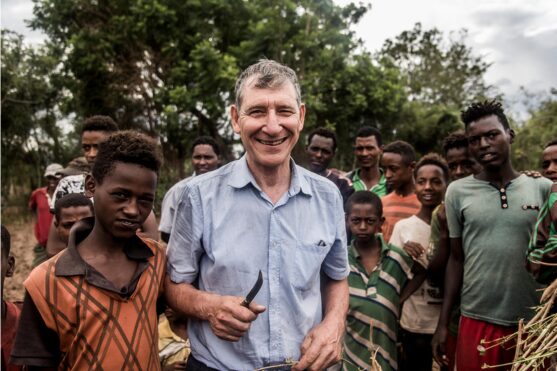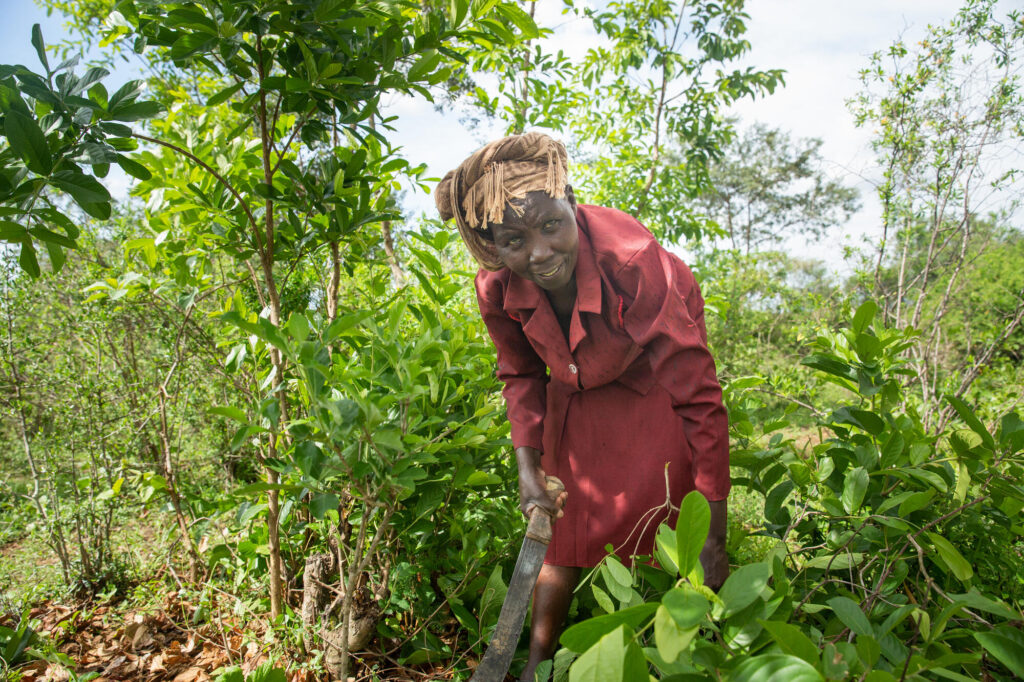Donors get behind World Vision’s bid to regreen 1 billion hectares

This story was first published in the hardcopy edition of Inspiring Stories of Giving volume 1 in October 2023.
A remarkable way of regenerating billions of hectares across the world without planting a single tree has been developed – and is set to be extended to 100 countries with the support of World Vision and philanthropy. The method not only revives barren landscapes and soaks up carbon, but also alleviates poverty and puts more food on people’s tables. And to top it off, the technique is up to 36 times cheaper than planting trees from scratch.
It’s called Farmer Managed Natural Regeneration (FMNR) and was brainchild of Tony Rinaudo, a humble Melbourne agronomist (pictured above), who devised it while working on the ground in Africa. It is essentially a practice that prunes, nurtures and protects existing root stock, giving it the space and nutrition it needs to grow into a fully fledged tree.
The increased concentration of growth means trees flourish, soil improves, crops grow more efficiently, trees produce more timber for fuel, environments cool and communities grow more resilient to future climate shocks, such as flood or drought. Not only that, but by breaking the cycle of poverty, it restores hope and confidence in communities. It’s simple, incredibly low-cost and can be rolled out quickly by local communities.
World Vision aims, directly and through partners around the world, to regenerate 1 billion hectares of land, which it says will remove up to 25% of carbon from the atmosphere, prevent species loss and end extreme poverty for millions of people. Having seen what it has achieved in 27 countries already, the organisation has launched a campaign to grow that footprint to 100 countries by 2030.

Daniel Wordsworth, CEO of World Vision Australia, says: “During the past 25 years, I have worked in some of the toughest corners of the globe, in places ravaged by conflict and climate, where destitution is a way of life. Among the various methods we use to combat poverty, this technique is without doubt the most effective tool for poverty eradication I have ever seen.”
From small beginnings, FMNR has already regreened more than 25 million hectares and changed lives and livelihoods.
World Vision is building a movement of businesses, governments, institutions, farmers and everyday donors to unleash FMNR on a scale not seen before. World Vision Australia is aiming to raise $25 million during the next few years to rapidly scale FMNR in four “catalytic countries” – countries with social, political and landscale environments that make them ripe and ready for exponential growth. And it is already well on its way to achieving that first major goal.
The potential impact is almost limitless. There are around 3 billion hectares of degraded land ripe for this kind of restoration, across Asia, Africa and the Pacific. Previously, it was generally understood that “regreening” means planting trees. Tree-planting has potential, but it is expensive and unreliable. Evidence shows that only 20% of trees planted in degraded landscapes survive. By using instead what already exists – what World Vision calls “invisible” or “underground forests” – the chances of success are greatly increased.
Tony’s passion for FMNR is based on his experiences working in Niger in the 1980s, planting thousands of trees only to see them perish after failing to establish themselves in the harsh landscape of the Sahel. But now with FMNR, Tony and the many farmers he has trained over the years, have managed to regreen more than five million hectares of a country in one of the most challenging ecological environments on the planet.
As Australia extends its ambitions for carbon-emissions reductions and sets net-zero targets, World Vision believes the role of nature-based solutions has enormous potential in the fight against climate change.